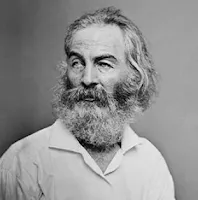Miracles
By
Walt Whitman
About the Poet:
 |
| Walt Whitman |
Walt Whitman (May 31, 1819 – March 26, 1892) was an American poet, essayist, and journalist and humanist. He was a part of the transition between transcendentalism and realism, incorporating both views in his works. Whitman is among the most influential poets in the American canon, often called the father of free verse, though he did not invent it.
Poem
As to me I know of nothing else but miracles,
Whether I walk the streets of Manhattan,
Or dart my sight over the roofs of houses toward the sky,
Or wade with naked feet along the beach just in the edge of the water,
Or stand under trees in the woods,
Or talk by day with any one I love, or sleep in the bed at night with any one I love,
Or sit at table at dinner with the rest,
Or look at strangers opposite me riding in the car,
Or watch honey-bees busy around the hive of a summer forenoon,
Or animals feeding in the fields,
Or birds, or the wonderfulness of insects in the air,
Or the wonderfulness of the sundown, or of stars shining so quiet and bright,
Or the exquisite delicate thin curve of the new moon in spring;
These with the rest, one and all, are to me miracles,
The whole referring, yet each distinct and in its place.
To me every hour of the light and dark is a miracle,
Every cubic inch of space is a miracle,
Every square yard of the surface of the earth is spread with the same,
Every foot of the interior swarms with the same.
To me the sea is a continual miracle,
The fishes that swim—the rocks—the motion of the waves—the
ships with men in them,
What stranger miracles are there?
In fact, miracles can be seen in our day to day life. For him, walking down the streets of Manhattan (a popular American city) is a miracle. He ponders over nature and says that the vast expanse of the sky, the soothing effect of the waves, watching stars in the moonlit sky, standing under the shade of the trees, watching the activities of honey bees during summer days, animals feeding themselves in the fields, feeling the sun on our faces and observing the fine, thin curve of the new moon in Spring are all miracles to him. The poet further says that having a conversation with our beloved ones, eating dinner with our family members and looking at the strangers sitting opposite to us in the car are all miracles.
The poet finally winds up his count of miracles by saying that there are limitless miracles but all of them have specific importance at their respective places. From his point of view every hour of the day and night, every cubic inch of the world and space, every square yard of the earth, and every foot of the interior of the earth is dominated and crowded with miracles. The endless seas, the enormous fishes, the beautiful rocks, the movement of the waves and the sailing of the ships with men in it, are all marvellous and miraculous from the poet’s point of view.
Exercise
Ans: To Walt Whitman, miracles are the only things he believes in. To him, everything is a miracle.
Q.2. When you read the poem, you notice that some 'miracles' are from nature, others are connected with nature, people and city life. Make lists of these.
Ans:-
Miracles of City: Streets of Manhattan, roofs of houses, sitting for dinner, sitting with strangers in the car.
Q.3. What do the lines about Manhattan and the subway car tell us about Whitman's feelings for people?
Ans: The lines about Manhattan and the subway car bring out the poet's love for the world around him. To him, observing the world around him and it's people seems to give endless pleasure which is why he seems to term it all a miracle among many others.
Q. 4. Have you ever come across a miracle in your life ?If yes,write an account of it in 150 words?
- wade with naked feet along the beach,
- stand under trees in the woods,
- sit at table at dinner with the rest,
- look at strangers opposite me riding in the car,
- animals feeding in the fields, and
- thin curve of the new moon in spring



If you have any doubt, suggestion or question, feel free to contact us.